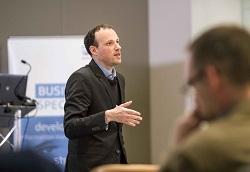People and Organisations

We are a diverse group of academics who research many aspects of work and organisations.
These can be broadly understood as centring on organisation studies and organisational psychology; and management and organisational learning, processes, change and innovation. Members of the department also have an interest in academic practices like research ethics and the politics of knowledge production.
Research into Employment and Equitable Futures
We seek to explore and shape the future direction of equitable futures, work and society with dedicated research into this area. In partnership with The People Space, this academic centre of excellence draws on the Department for People and Organisations' scholarly expertise on themes of identity, leadership, gender, bodies, ethics, power and learning to inform policy makers, organisational leaders, social practitioners and people from across contexts to work together to co-create innovative solutions for meeting these coming opportunities and challenges.
Gendered Organisational Practice
This research cluster takes feminist solidarity as a starting point to create a space where feminists of any gender can share insights and knowledge from academic study and practice. The cluster fosters continuous collaboration and exchange between practitioners and academics and provides a hub for those interested in developing equality through their research, but also for practitioners wanting to make their organisations more egalitarian and fairer places. Current areas of expertise include gendered working bodies, feminist organising and gender and sexuality.
Research interests
Organisation studies and organisational psychology
- Alternative organisations and organising
- Civil society organisations
- Corporate social responsibility
- Critical approaches to leadership and leadership dilemma
- Critical management studies
- Diversity in organisations
- Emotions in organisations
- Employee branding
- Financialisation and political and ethical responses
- Gender, sexuality, the body in organisations and how bodies are organised
- Human-animal relations in organisations
- Individual and group behaviour in organisational contexts
- The interplay between work and health
- Organisational democratic practice
- Organisational and individual identity, subjectivity, selfhood and the meaning of work
- Organisations, work and social inclusion
- Post-colonial relations in organisations
- Power, politics and organisations
- Professional occupations
- Precarious work
- The production, dissemination and contestation of meaning in organisations
- The psychology of financial behaviour
- Risk, uncertainty, and resilience
- Sociological accounts of work
- Transformations in technological and institutional conditions
Management and organisational learning, processes, change and innovation
- Change management
- Cross-cultural differences and self and group regulation in online learning
-
Collective organising and social learning processes
-
Decision-making under radical uncertainty
-
The development of business and management practices
-
Entrepreneurship
-
Formal and informal learning in organisations
-
Green HRM
-
Higher education management
-
Knowledge management
-
Management Information Systems
-
Managing inter-organisational relations in complex services
-
Management practices
-
Operations management
-
Serious games and the contribution of gamification to organisational learning and innovation
-
Strategic change
-
Supply chain management and behaviour
-
Supply chain analytics and modelling
-
Supply chain performance measurement systems
-
Sustainability and resilience in the supply chain
Academic practices
- Embodiment and affect in research
- The politics of academic knowledge production
- Research ethics
- Research methods
Academic Publications
Full details of our research publications can be found on Open Research Online and via our staff pages.
Teaching
Members of the Department teach across undergraduate, postgraduate and executive education modules in areas such as organisational behaviour, management of learning and change, professional development, human resource management, creativity, leadership, innovation, organisational culture and organisational development. We also run the CIPD accredited MSc in Human Resource Management.
Contact the Department for People and Organisations
For all department-related enquiries, please email us.
For all other enquiries, including student and alumni, please visit our contact us page.
Doubt, depression, anxiety – just some of the problems plaguing the veterinary profession
Mental health issues, alcohol and drug abuse, a high incidence of stress and suicide, excessive staff turnover rates, and a failure to adapt to the increasing demographic dominance of women. These are all serious challenges facing the veterinary profession in the UK.
Using virtual reality technology to tackle hate and extremism in England
The Open University has received funding to research, pilot and evaluate the use of virtual technology (VR) to combat extremism among vulnerable young people.

Money for nothing? The pros and cons of a ‘basic income’
The recent news that the Finnish Government will not be expanding its trial which provided 2,000 unemployed people with a state-supplied basic income has sparked fresh debate on the topic.

Have we anything to fear from the ‘fourth industrial revolution’?
A life full of copious amounts of leisure time with mundane tasks a thing of the past, or a world with mass unemployment which is ruled by machines?
The Open University Business School to host ICMS 2019
The Open University Business School in collaboration with VIDA, the Critical Management Studies Women's Association, has been selected, from a shortlist of excellent proposals, to host the 11th International Critical Management Studies 2019 conference around the theme of “Precarious Presents, Open Futures”.

The need for data empowerment
A critical question is how big data can be simultaneously empowering for employees and beneficial to employers.
Does work have a future?
In this podcast, Dr Peter Bloom discusses whether there is a future for work.
Diversity, Migrant Entrepreneurship and Socio-Economic Inclusion
Dr Cinzia Priola, Senior Lecturer in Organisation Studies, discusses the need to pay attention to diverse groups of workers.
New free online course on Modern Empowerment in the Workplace
Modern Empowerment in the Workplace explores the benefits and dangers of increased empowerment of employees in the 21st Century workplace.
Inequalities, discrimination and the pay gap
Can HR play a role in fostering workplace inclusion and equality?
News

How to design menopause leave policies that really support women in the workplace
More than 15 million women are in employment in the UK right now, which means menopause is undoubtedly a workplace issue. In this article, Jo Brewis, Professor of People and Organisations writes about how to design menopause leave policies that really support women in the workplace.
- How to design menopause leave policies that really support women in the workplace
- Learning different ways to do HR in different organisations and countries
- The rise and fall of Topshop. OU/BBC series lifts the lid on iconic brand’s fall from grace
- Small bakery owners: we want your views!
- Self-employment: what is it, why do it and how has the pandemic affected it?
